"We Have Entered a New Historical Era": Larry Diamond on the Future of Democracy
In these next few minutes, I’d like to reflect on the moment we are at in world history, and what it means for the future of democracy. I know you have already heard a lot today, and will hear more tomorrow, about the war in Ukraine and its global implications. Here is my perspective.
Russia’s brutal and unprovoked aggression against Ukraine, which is now about to enter its seventh week, is the most important event in the world since the end of the Cold War. 9/11 changed our lives in profound ways, and even changed the structure of the U.S. Government. It challenged our values, our institutions, and our way of life. But that challenge came from a network of non-state actors and a dead-end violent jihadist ideology that were swiftly degraded. The Russian invasion of Ukraine, and the larger rising tide of authoritarian power projection, represent the return of great power competition. And more, they denote a new phase of what John F. Kennedy called in his 1961 inaugural address a “long twilight struggle” between two types of political systems and governing philosophies. Two years after JFK’s address, Hannah Arendt put it this way in her book, "On Revolution":
No cause is left but the most ancient of all, the one, in fact, that from the beginning of our history has determined the very existence of politics, the cause of freedom vs. tyranny.
That is what the war in Ukraine, the war FOR Ukraine, is about: not about Ukraine someday joining NATO, but about Ukraine — a country so important to Russia’s cultural heritage and historical self-conception — becoming a free country, a functioning liberal democracy, and thus a negation of and an insult to everything that Vladimir Putin and his kleptocratic Kremlin oligarchy cynically represent.
But it is not simply a “Resurrected Russia” (as Kathryn Stoner has termed it) that is counterposed to the global cause of freedom. The greater long-term threat comes from China’s authoritarian Communist party-state. China has the world’s fastest growing military and the most pervasive and sophisticated system of digital surveillance and control. Its pursuit of global dominance is further aided by the world’s most far-reaching global propaganda machine and a variety of other mechanisms to project sharp power — power that seeks to penetrate the soft tissues of democracy and obtain their acquiescence through means that are covert, coercive, and corrupting. It is this combination of China’s internal repression and its external ambition that makes China’s growing global power so concerning. China is the world’s largest exporter, its second largest importer, and its biggest provider of infrastructure development. It is also the first major nation to deploy a central bank digital currency; and it is challenging for the global lead in such critical technologies as AI, quantum computing, robotics, hypersonics, autonomous and electric vehicles, and advanced telecommunications.
While China now innovates in many of these technologies, it also continues to acquire Western intellectual property through a coordinated assault that represents what former NSA Director General Keith Alexander calls “the greatest transfer of wealth in human history.” And every technological innovation that China can possibly militarize it does, through a strategy of “civil-military fusion.” With this accumulated power, Beijing plans to force Asia’s most vibrant liberal democracy, Taiwan, to “reunify with the motherland.” It also seeks to establish unilateral Chinese control over the resources and sea lanes of the South China Sea, and then gradually to push the United States out of Asia.
Russia’s aggression must be understood in this broader context of authoritarian coordination and ambition, challenging the values and norms of the liberal international order, compromising the societal (and where possible, governmental) institutions of rival political systems, and portraying Western democracies — and therefore, really, democracy itself — as weak, decadent, ineffectual, and irresolute. In this telling, the democracies of Europe, Asia, and North America — especially the United States — are too commercially driven, too culturally fractured, too riven by internal and alliance divisions, too weak and effeminate, to put up much of a fight.
At the same time, China, Russia, and other autocracies have been denouncing the geopolitical arrogance of the world’s democracies and confidently declaring an end to the era in which democracies could “intervene in the internal affairs of other countries” by raising uncomfortable questions about human rights.
On the eve of the Beijing Winter Olympics on February 4, Vladimir Putin and Xi Jinping issued a joint statement denouncing Western alliances and declaring that there were no limits to the strategic partnership between their two countries. Many analysts believe Putin told Xi then that he was about to invade Ukraine and that Xi probably said, okay, just wait till the Olympics are over and make it quick.
Four days after Xi’s closing Olympics fireworks display, Putin launched his own fireworks by invading Ukraine. It has been anything but successful or quick. Xi cannot possibly be pleased by the bloody mess that Putin has made of this, which helps to explain why China twice abstained in crucial UN votes condemning the Russian invasion, rather than join the short list of countries that stood squarely with Russia in voting no: Belarus, Eritrea, Syria, and North Korea. Xi must think that Putin’s shockingly inept and wantonly cruel invasion is giving authoritarianism a bad name.
It is also costing China a lot of money in global trade at a time when China’s economic growth rate has slowed dramatically. And it’s undermining the narrative China was trying to push that the autocracies know what they are doing and represent the wave of the future. Moreover, this is coming at a moment when one of China’s two most important cities, Shanghai, is gripped by panic and a substantial lockdown over the Covid-19 virus, which Xi’s regime has no other means to control except lockdown, because it has refused to admit that the vaccines it developed are largely ineffective against the current strains of Covid, and instead import the vaccines that work.
All of this explains why this moment could represent a possible hinge in history as significant as the 1989-91 period that ended the Cold War. 2021 marked the fifteenth consecutive year of a deepening democratic recession. In both the older democracies of the West and the newer ones of the global South and East, the reputation of democracy has taken a beating. A narrative has been gathering that democracies are corrupt and worn out, lacking in energy, purpose, capacity, and self-confidence. And this has been fed by real-world developments, including the reckless and incompetent US invasion of Iraq, the 2008 financial crisis, steadily rising levels of economic inequality, widespread job losses, economic insecurity and status anxiety due to globalization and technological change, and the challenges of managing cultural diversity amid expanding immigration. These factors have fed or at least facilitated the rise of populist challengers to liberal democracy and the decay of democratic norms and institutions across many democracies — rich, poor, and middle-income.
The Germans have a word for these trends in the global narrative: “zeitgeist” — the spirit of the times, or the dominant mood and beliefs of a historical era. In the roughly 75 years since WWII, we have seen five historical periods, each with their own dominant mood. From the mid-1940s to the early 60s, the mood had a strong pro-democracy flavor that went with decolonization. It gave way in the mid-1960s to post-colonial military and executive coups, the polarization and waste of the Vietnam War, and a swing back to realism, with its readiness to embrace dictatorships that took “our side” in the Cold War. Then, third, came a swing back to democracy in southern Europe, Latin America, and East Asia, and a new wave of democracy, from the mid-1970s to around 1990. That period of expanding democracy was then supercharged by a decisively pro-democratic zeitgeist from 1990 to 2005, the so-called unipolar moment in which one liberal democracy, the U.S., predominated. That period ended in the Iraq debacle, and for the last 15 years, we have been in the tightening grip of a democratic recession and a nascent authoritarian zeitgeist.
Could Russia’s criminal, blundering invasion of Ukraine launch a new wave of democratic progress and a liberal and anti-authoritarian zeitgeist? It could, but it will require the following things.
First, Russia must fail in its bid to conquer and extinguish Ukraine. The United States and NATO must do everything possible, and much more than we are doing now, to arm and assist Ukraine militarily, and to punish Russia financially and economically.
Second, we must wage a more effective and comprehensive battle of information and ideas to expose Russia’s mendacity and criminality and to document its war crimes, not only before the court of public opinion, but in ways that reach individual Russians directly and creatively. We need an intense campaign of technological innovation to circumvent authoritarian censorship and empower Russian, Chinese, and other sources that are trying to report the truth about what is happening and to promote critical thinking and the values of the open society. In general, we need to promote democratic narratives and values much more imaginatively and resourcefully. The message of the Russian debacle in Ukraine is an old one and should not be difficult to tell: autocracies are corrupt and prone to massive policy failures precisely because they suppress scrutiny, independent information, and policy debate. Democracies may not be the swiftest decision makers, but they are over time the most reliable and resilient performers.
Third, we must ensure that we perform more effectively as democracies, and with greater coordination among democracies, to meet the challenges of developing and harnessing new technologies, creating new jobs, and reducing social and economic inequalities.
Fourth, to win the technological race, for example in semiconductors, artificial intelligence, biomedicine, and many other fields of science, engineering, and production, we must open our doors more widely to the best talent from all over, including China. We URGENTLY need immigration reform to facilitate this. As our late colleague George Shultz said: Admit the best talent from all over the world to our graduate programs in science and engineering, and then staple green cards to their diplomas.
Finally, we have to reform and defend our democracy in the United States so that it can function effectively to address our major domestic and international challenges, and so that American democracy can once again be seen as a model worth emulating. We cannot do this without reforming the current electoral system of "first-past-the-post" voting and low-turnout party primaries, which has become a kind of death spiral of political polarization, distrust, and defection from democratic norms.
I believe we entered a new historical era on Feb 24. What the Ukrainian people have suffered already in these seven weeks has been horrific, and it will get worse. But the courage and tenacity of their struggle should renew our commitment not only to them but also to ourselves—that freedom is worth fighting for, and that democracy, with all its faults, remains the best form of government.

Read More
Speaking at the April 2022 meeting of the FSI Council, Larry Diamond offered his assessment of the present dangers to global democracy and the need to take decisive action in support of liberal values.





















 Oriana Skylar Mastro is a Center Fellow at Stanford University’s Freeman Spogli Institute for International Studies (FSI). Within FSI, she works primarily in the Shorenstein Asia-Pacific Research Center (APARC) and the Center for International Security and Cooperation (CISAC) as well. She is also a fellow in Foreign and Defense Policy Studies at the
Oriana Skylar Mastro is a Center Fellow at Stanford University’s Freeman Spogli Institute for International Studies (FSI). Within FSI, she works primarily in the Shorenstein Asia-Pacific Research Center (APARC) and the Center for International Security and Cooperation (CISAC) as well. She is also a fellow in Foreign and Defense Policy Studies at the